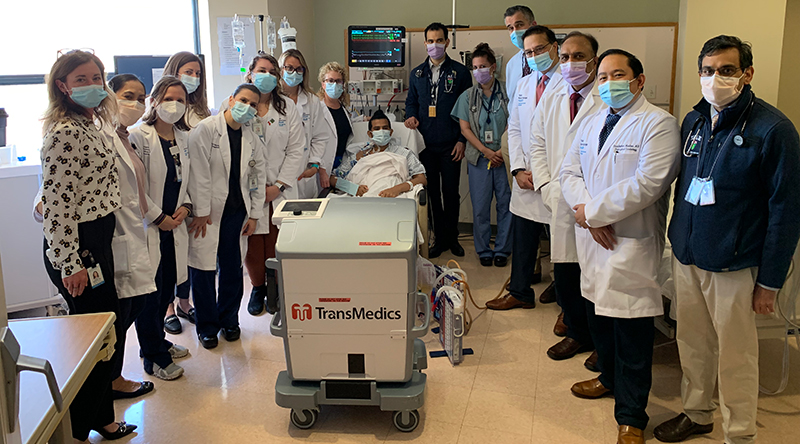-
Services
Featured Specialties
-
Locations
Location Type
-
Patients & Visitors

Ram Devkota, center, recently received a donated heart transported in the Organ Care System device (at the foot of the bed). YNHH’s Heart and Vascular Center is the first in Connecticut to use the device, which keeps donor hearts viable longer. With Devkota are members of the Heart and Vascular Center and Yale New Haven Transplantation Center teams.
The day after his heart transplant, Ram Devkota, 31, sat in his room on Yale New Haven Hospital’s Cardiothoracic Intensive Care Unit and looked out the window, watching the sun rise.
“It’s a new day,” he thought, and in more ways than one.
Three days before, surgeons with Yale New Haven’s Heart and Vascular Center used a device called the Organ Care System (OCS) to transport a heart from a donor hundreds of miles away to New Haven, where they transplanted it into the North Haven man. YNHH is the first hospital in Connecticut – and one of only a handful nationwide – to use the OCS, informally called “heart in a box.”
Without it, Devkota would not have been able to receive this heart because the donor was too far away. In conventional heart transplants, members of the YNHH Heart and Vascular Center travel to the donor center to retrieve the heart and use cold storage to transport it back to YNHH.
“To maintain optimal heart function, retrieval, transport and transplantation must occur within four hours,” said Tariq Ahmad, MD, chief of the Heart Failure Program, and medical director of advanced heart failure, Cardiovascular Medicine. “That limits the distances from which a donor heart can be procured, which limits the number of hearts available to patients awaiting a transplant.”
The “heart in a box” technology, developed by TransMedics, keeps the donated heart warm, beating and regularly infused with oxygenated blood. It allows for considerably more time between retrieval of the donated heart and transplantation into the recipient.
The device also allows surgeons to transplant hearts from patients who have experienced cardiac death. Traditionally, hearts could only be procured from patients with irreversible loss of brain function.
All of this means that more hearts are available to patients such as Devkota. For years, he experienced on and off symptoms of hypertrophic cardiomyopathy, a thickening of the heart muscle. Often inherited, hypertrophic cardiomyopathy restricts blood flow to the body, causing fatigue, shortness of breath, chest pain and eventually heart failure. When Devkota came to YNHH’s Emergency Department in 2020, his heart was barely functioning.
“It was tough to breathe,” he said. “I wasn’t able to do anything.”
YNHH Heart and Vascular Center surgeons implanted a left ventricular assist device (LVAD), which takes over the work of the heart and helps circulate blood throughout the body. Some patients use an LVAD their entire lives; others, such as Devkota, use it until they can receive a heart transplant.
After seven months in the hospital awaiting a transplant, Devkota has his new heart and is doing great, his doctors said. The day after surgery, he was sitting up in bed, eating breakfast.
“I feel like it’s a different world,” Devkota said. “I feel like everything is new.”
Visit YNHH’s Heart Failure program, including transplant, for more information.